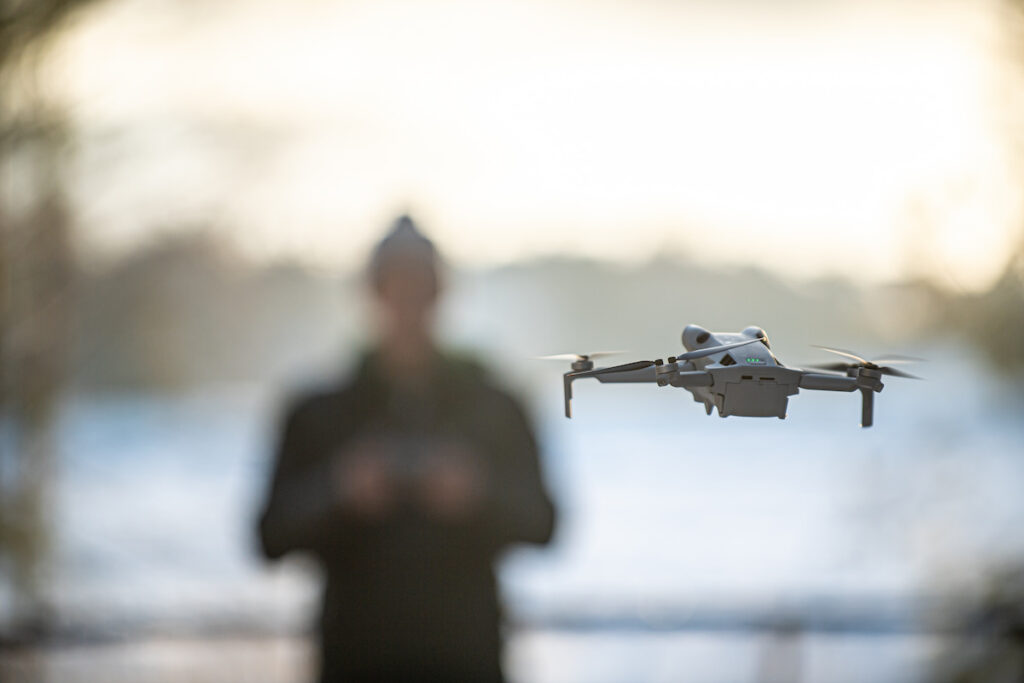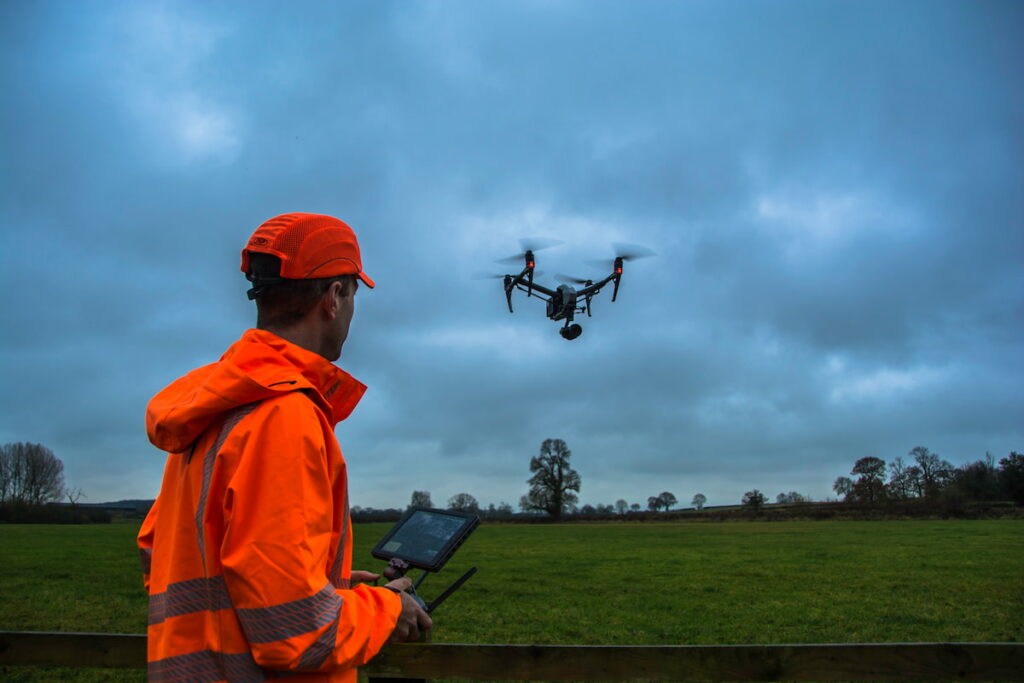Drones, also known as Unmanned Aerial Systems (UAS), are transforming industries across the globe. From military use to agriculture, logistics and emergency response, their potential impact seems limitless. Now, as demand for drone technology grows, so does the need for professionals who understand the new technology.
That’s where IE School of Science & Technology‘s new elective comes in. As of September 2025, “Unmanned Aerial Systems: Strategy and Technology” will be available to students of the Master in Computer Science & Business Technology, the Master in Computer Science & Digital Innovation and the Master in Business Analytics & Data Science. With a comprehensive overview of drone technology and its practical applications, this elective is an exciting step towards the future of tech careers.
But don’t just take our word for it—let’s see why Enrique García and David Hernández, the creators of the elective, think studying Unmanned Aerial Systems is a smart step for any budding tech professional.
How has the UAS industry expanded?
The growth of drones owes to several factors. One such is the technological advancements made over the past 30 to 40 years, particularly in the last decade. “The development of drones has its roots in technology advancements over the last 30-40 years, driven by sectors like defense,” says Enrique García, a senior manager at the International Air Transport Association. “The boom happened around 15-10 years ago as technology for remote control improved, enabling broader business applications.” From early military use—such as Predator drones—to civilian roles in agriculture, inspection, and parcel delivery, the scope of drone applications continues to grow at an accelerated pace.
“The global commercial drone market is expected to expand significantly in the next few years,” says Enrique. “Market reports estimate that the industry could grow from around $11 billion in 2023 to as much as $48 billion by 2029. The rise is driven by innovations in sensors, cybersecurity, remote control systems, and communication networks—all interconnected domains that influence one another.”
Companies and governments worldwide recognize these trends. That puts a premium on expertise in drone technologies and their strategic deployment.

Beyond commercial activity, the defence sector is a top market for UAS. “Drones are revolutionizing military tactics and strategy,” says David Hernández, Head of Mission Readiness Air Power at Airbus Defence and Space. “From predators 20 years ago to newer models used today, they’re shaping how armed forces operate and project power globally.”
The opportunities are immense. They span across software, hardware, operational management, and strategic consultancy—fields that demand a skilled workforce. And that’s exactly the reality that IE School of Science & Technology is preparing its students for.
How will UAS affect our everyday lives?
When we talk about Unmanned Aerial Systems, we shouldn’t just examine industries and markets. The fact is, Unmanned Aerial Vehicles (UAVs) are going to become visible in our everyday lives. “Drones are already used extensively in agriculture, oversight, emergency response and more,” says Enrique. “Soon, we’ll see a profound influence on urban transportation and parcel delivery, even though change has been slower in those areas.”
It’s an echo of the internet revolution, where initial skepticism eventually gives way to major lifestyle shifts. And, according to David, Artificial Intelligence will play a major role in that: “AI’s incorporation into drone systems can significantly improve their efficiency. It’s about scalability and identifying exactly where AI applications can generate value in real-world scenarios.” Intelligent drone systems can autonomously learn, adapt to varying environments and execute complex tasks with minimal human intervention. That, in turn, will have a huge effect on companies looking to deliver services faster, safer and more cost-effectively.
It’s all very exciting—but Enrique insists human control is a priority. “Regulations remain pivotal, especially with increasing AI integration,” he says. “Legal frameworks must evolve alongside technology to safeguard everyone involved.” In order to navigate international and local drone laws, we’ll need professionals who can interpret regulatory change while understanding how this affects technical aspects of drone technology.
What will you learn from the UAS elective?
The UAS elective combines theoretical knowledge with hands-on experience. Both Enrique and David stress the importance of direct industry engagement to prepare students for real-world challenges: “We plan to bring in experts who are actively using drones, whether for defense or civilian purposes,” says Enrique. “Our teaching style is interactive. I encourage curiosity, and students will benefit from practical case studies and input from working professionals.”
“Teaching allows me to share insights gained from my years of experience, while also gaining new perspectives from students,” says David. “The interaction offers fresh challenges and an opportunity to witness how students perceive emerging technologies and industries. This exchange enriches both my professional career and personal growth, highlighting the dynamic nature of education as mutual learning.”
The elective aims to go beyond traditional classroom lectures, integrating expert input, industry visits, and even practical projects.

Enrique also praises the possibility of students building their own UAS: “Moving from theory to practical application will give students a profound sense of achievement and a real understanding of the challenges involved in designing, deploying, and managing drone systems.”
“The potential of drones is immense in sectors like delivery services, infrastructure inspection and public safety,” says Enrique. “Students need to recognize these opportunities early and learn how to position themselves at the forefront of industry developments.”
How can this new UAS elective prepare you for the future?
“UAS are the future,” says David. “Their potential reaches beyond what we can currently imagine, bound to the ground as our perspective is. It’s an early-stage field, rich with risks but also immense opportunities for those who are willing to pioneer.” With increasing investment from both public and private sectors, the demand for technically skilled and strategically minded leaders will only grow.
UAS career paths will span software development, hardware engineering, strategic consulting, regulatory affairs and entrepreneurial ventures. Students with a blend of engineering expertise and strategic insight—like those who take the drone elective—will be well-positioned for these roles.
“Few business schools around the world are combining tech innovation with strategic industry insights like IE,” says David. “Our students will gain an edge that is essential for the future.”

Whether in defense, logistics, urban planning, or industry regulation, the possibilities are vast—and the stakes high. Those who choose to explore this field now will be part of shaping an industry that might one day change how we live, work, and navigate our world. With expert insight from industry professionals and a focus on practical, experiential learning, IE’s new elective positions students at the cutting edge, ready to lead in a future where UAVs are ubiquitous. As David concludes, “The journey of exploring UAVs is just beginning, and the potential for transformative change is immense. Embracing innovation and remaining forward-looking will equip future generations to lead industries and contribute meaningfully to technological progress.”
Study with us at IE School of Science & Technology
The future of drones is bright. Join us at IE School of Science & Technology to enhance your profile and become truly future proof. With expert-led instruction, practical projects and industry engagement, you’ll be perfectly positioned to seize opportunity.
Fill in the form below or follow the link to find out more about our programs.
Study Unmanned Aerial Systems at IE School of Science & Technology
Become a future-proof professional with a groundbreaking master’s degree.

Benjamin is the editor of Uncover IE. His writing is featured in the LAMDA Verse and Prose Anthology Vol. 19, The Primer and Moonflake Press. Benjamin provided translation for “FalseStuff: La Muerte de las Musas”, winner of Best Theatre Show at the Max Awards 2024.
Benjamin was shortlisted for the Bristol Old Vic Open Sessions 2016 and the Alpine Fellowship Writing Prize 2023.






